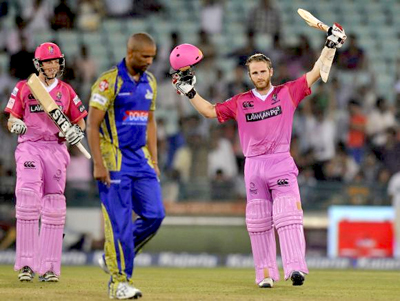Raipur, Sep 20: Rains took some sheen off Kane Williamson's record batting display of scoring the fastest ever century in Champions League Twenty20 as New Zealand side Northern Knights beat Cape Cobras of South Africa by 33 runs under Duckworth-Lewis method here on Friday.
 Opening batsman Williamson produced a sensational batting show as he carried his bat through the innings with a 49-ball 101 not out, the first hundred of this edition, to guide his side to a huge total of 206 for five after being put into bat.
Opening batsman Williamson produced a sensational batting show as he carried his bat through the innings with a 49-ball 101 not out, the first hundred of this edition, to guide his side to a huge total of 206 for five after being put into bat.
Chasing a huge target of 207 for a win, the Cobras struggled to get going and they were 44 for two when rain arrived at the Shaheed Veer Narayan Singh International Stadium.
Rain continued and after a long wait, the umpires decided to end the Group B match and the Knights emerged victorious under the D/L method.
As five overs had been completed before the rain came, the match was counted as complete and the par score under D/L method at that stage was 77.
The Knights kept their winning momentum in the tournament as they had won all their three qualifying round matches.
The Cobras run chase began on a disastrous note with their opening batsman Stiaan van Zyl (0) dismissed in the first delivery of the innings bowled by Trent Boult.
The other opener Hashim Amla (20) tried to keep his side on track but the asking rate kept on rising and he fell in the sixth over in his bid to accelerate the innings.
Robin Peterson and Omphile Ramela were batting on 17 and four respectively when rain came in the eighth over, though the Cobras were looking down the barrel at that stage as the asking rate had risen over 12 an over.
Earlier, Williamson scored his first T20 hundred to take his side to a huge total. Today's total of 206 for five by the Knights was the first 200-plus innings of this edition.
Williamson hit eight fours and five sixes in his superlative 49-ball innings and his hundred came from just 48 balls.
His opening partner Anton Devcich also made a substantial contribution of 67 from 46 balls (8x4; 1x6). The duo scored at a brisk pace and laid the foundation of a big total by sharing 140 runs in 13.4 overs.
Knights captain Daniel Flynn, however, did not contribute much as he was out for nought two balls after Devcich's dismissal.
But Williamson continued his punishing mood as he made merry of a mediocre bowling and fielding display from the Cobras to steal the show.
B J Watling joined the party with a 20-ball cameo of 32 as he took 17 runs off Justin Kemp with a six and two fours in the 16th over.
Scott Styris and Daryl Mitchell were also out for noughts but the strong show by the openers ensured that go past the 200 mark.
For the Cobras, Charl Langeveldt and Vernon Philander took two wickets apiece while conceding 27 and 37 runs. Ll the Cobras bowlers, except for Langeveldt, were expensive with Justin Kemp conceding 34 runs from his two overs.





Comments
Add new comment